MercoPress. South Atlantic News Agency
Tag: Favelas
-
Friday, May 25th 2012 - 21:40 UTC
Almost 19 million urban Brazilians live with no access to drinking water of sewage
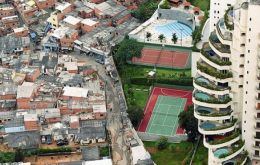
Almost 19 million Brazilians live in precarious housing with no running water, sewage or any basic public services, according to a report on urban infrastructure by the Brazilian Geography and Statistics Institute, IBGE.
-
Monday, May 14th 2012 - 19:22 UTC
Brazil military police occupies favelas in Rio to prevent full fledged drugs war

Brazilian police was out in full force to occupy for an indefinite period a group of favelas (shanty towns) surrounding the ‘marvellous’ city of Rio do Janeiro following the killing of the state’s most wanted drug lord.
-
Monday, November 14th 2011 - 06:32 UTC
Brazilian troops take over Rio’s main favela without firing a shot
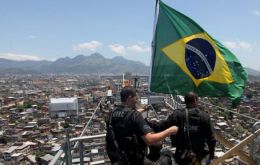
Three thousand troops backed by helicopters and armoured vehicles occupied Rio de Janeiro's largest favela (slum) without firing a shot, the biggest step in the Brazilian city's bid to improve security and end the reign of drug gangs.
-
Friday, November 11th 2011 - 08:26 UTC
Most wanted Brazil drugs’ baron caught by police in Rio do Janeiro favela

As authorities work to “pacify” Brazil's slums ahead of two global sporting events, police in Rio de Janeiro captured one of the city's most notorious drug traffickers.
-
Thursday, November 10th 2011 - 06:01 UTC
War zone in Rio as police prepares to take control of the city’s biggest favela
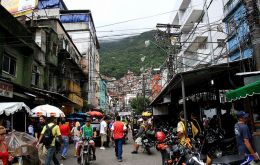
Brazilian police made two key arrests Wednesday in Rio de Janeiro's biggest favela (slum) as they ready to take control of the area from drug traffickers, in anticipation of the 2014 World Cup and 2016 Olympic Games.
-
Saturday, October 8th 2011 - 08:13 UTC
Justice Minister admits a “culture of violence” and “impunity” in Brazil
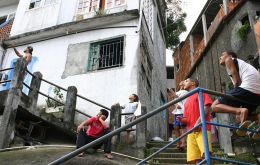
“Economic interests” and a “culture of violence” are to blame for rate crimes in Brazil and conspire against government plans to disarm the population and improve security, claimed Justice Minister Jose Eduardo Cardozo.
-
Thursday, September 8th 2011 - 00:52 UTC
Brazilian forces try to regain control of shanty town again lost to criminal gangs
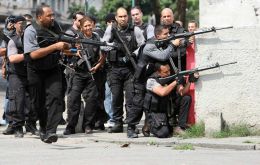
As Brazilians celebrate Wednesday September 7, Independence Day – a national holiday – Brazilian forces are engaged in trying to regain control of one of Brazil’s largest favelas.
-
Friday, May 20th 2011 - 19:29 UTC
Brazil’s Golden Age–or Parade of White Elephants?

by COHA Research Associate Augustus Urschel.
The 2014 World Cup and 2016 Olympics.
Winning the 2014 World Cup and 2016 Summer Olympic bids continues to have both intended and unexpected consequences for this year’s miracle country. On November 28, 2010, Brazilian police and soldiers seized the Complexo do Alemão, a large favela in the Northern Zone of Rio, from drug lords. -
Thursday, March 17th 2011 - 07:36 UTC
World Bank loan to improve quality of life in Rio do Janeiro’s favelas

Some two million people who live in informal low income settlements (favelas) in the Rio de Janeiro Metropolitan Region, Brazil, will be benefiting from a 485 million US dollars development policy loan for the Metropolitan and Housing Project approved by the World Bank.
-
Monday, February 7th 2011 - 14:06 UTC
Rio do Janeiro police take hold of favelas in early operation with no shots fired
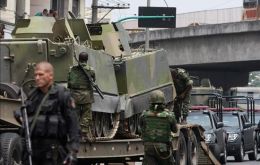
Rio do Janeiro police with the support of the Navy, other security agencies and armoured personnel vehicles in an flash operation on Sunday occupied nine “favelas,” or shantytowns dominated by drug gangs and did so “without a single shot,” officials said.
